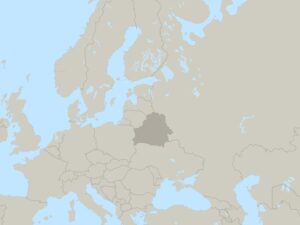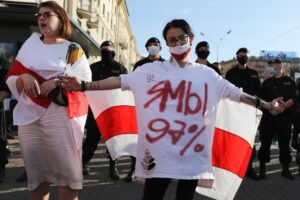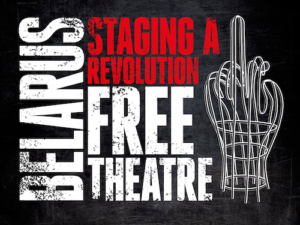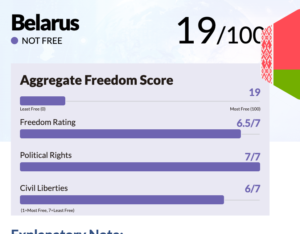Police in Belarus have arbitrarily arrested journalists, bloggers, and political activists ahead of the August 9, 2020 presidential election and pressed charges against two potential candidates, Human Rights Watch said today.
“Belarusian authorities are using flimsy pretexts to silence journalists and critics, which should never happen, but that has even more damning consequences for citizens’ rights in an election period,” said Hugh Williamson, Europe and Central Asia director at Human Rights Watch. “The international community should not ignore such serious flouting of human rights obligations.”
Belarus on Wednesday charged that more than 200 mercenaries from Russia, disguised as tourists, had infiltrated Belarus on a mission to disrupt its presidential election, The New York Times reports (HT:FDD). The authorities claim they were tipped off that militants planned to destabilize the country, according to state news.

Credit: HRW
A high-profile political analyst and strategist who has advised presidential candidates in the U.S., Russia and Ukraine has been detained in Belarus ahead of the election, The Moscow Times adds. “I have been arrested,” said Harvard University fellow Vitali Shkliarov.
President Aleksandr Lukashenko, 65, has accused opponents of working with foreign backers to overthrow him and has jailed two of his main election rivals, Reuters reports. He is expected to win the election despite growing opposition and protests over concerns about the economy, human rights and his handling of the COVID-19 pandemic.
 Lukashenko was among the first authoritarians to perfect the art of “preempting” democracy, the late political scientist and former Reagan-Fascell fellow Vitali Silitski (left) wrote for the NED’s Journal of Democracy.
Lukashenko was among the first authoritarians to perfect the art of “preempting” democracy, the late political scientist and former Reagan-Fascell fellow Vitali Silitski (left) wrote for the NED’s Journal of Democracy.
Reporters Without Borders (RSF) has warned of the “oppressive” climate surrounding media freedom in Belarus and condemned the “systematic” arrests of journalists covering pro-democracy demonstrations. More than 40 journalists have been detained over the past 10 weeks to prevent them from covering the “unprecedented” campaigns against Lukashenko’s reelection.

Credi Radio Svaboda Minsk-Radio-Free-Europe
Covid has prompted a civil society surge, VOA reports. Lacking federal support, Belarusian activists have rallied to address the health crisis.
Despite Lukashenko’s history of orchestrating elections and repressing political rights in Belarus, the August 9 presidential election has become increasingly contentious and dangerous, notes RFERL:
In recent weeks, the Belarusian government has imprisoned or otherwise disqualified opposition candidates and has threatened foreign journalists covering weeks of peaceful protests. A leading opposition candidate is Svyatlana Tsikhanouskaya, wife of imprisoned vlogger Syarhey Tsikhanouski. She is running with the support of the wives and staff of previously disqualified candidates. …. In this potentially volatile situation, including deepening concerns about the government’s handling of the coronavirus pandemic, President Lukashenko remains on the defensive as Belarusians get ready to vote.

Credit: BFT
Belarus is often labeled the “last dictatorship in Europe,” says analyst Polina Sadovskaya (Kovaleva). To wit, earlier this year, a number of activists and writers were put on trial for participating in demonstrations calling for independence from Russia’s influence, she writes for PEN America. The political landscape feels unlikely to change any time soon. But people will continue to gather in dark alleys to wait for performances by the Belarus Free Theater, she notes.
U.S. Senators Dick Durbin (D-IL), Marco Rubio (R-FL), and Ben Cardin (D-MD) this week introduced a bipartisan resolution calling for a free, fair, and transparent presidential election in Belarus, including the unimpeded participation of all presidential candidates. In March 2011, the U.S. Senate, led by Durbin and Ben Cardin (D-MD) and then-Senators Joe Lieberman (I-CT) and John McCain (R-AZ), unanimously passed a resolution condemning the Belarusian elections as illegitimate and calling on the Belarusian regime to immediately release all political prisoners.
“I will never forget visiting in January 2011 with the families of opposition candidates jailed by Lukashenko for having the temerity to run against him in the sham presidential election just the month before,” Durbin said. “That the Last Dictator of Europe continues to so brazenly rob his people of the basic freedoms enjoyed by the rest of Europe is a tragedy that must be condemned.”
 “ For 26 years, Lukashenko has silenced political opponents, suffocated the freedom of speech, and manipulated elections,” Cardin added. “With this resolution, we stand with the Belarusian people in saying enough is enough.”
“ For 26 years, Lukashenko has silenced political opponents, suffocated the freedom of speech, and manipulated elections,” Cardin added. “With this resolution, we stand with the Belarusian people in saying enough is enough.”
Belarus is an autocratic regime with strong parallels to the defective democracies in Russia and Ukraine. The communist legacy is partially responsible for the similarity of the cases, analyst Timm Beichelt writes for Democratization. Economic crisis, the unequal distribution of power resources, the ‘dark side’ of civil society, the identity crisis in nation-building and societal fragmentation all contribute to shared democratic defects.
The German Marshall Fund of the United State’s Frontlines of Democracy Initiative and its Warsaw Office invite you to a timely discussion focused on the increasingly contentious election. Speakers will discuss the current state of play in the Belarus presidential election, the key issues impacting voters, the state of civil society and media, and how politics will look in their country after the election.
 On Edge: The Belarus Election in Focus. Wednesday, August 5, 2020.
On Edge: The Belarus Election in Focus. Wednesday, August 5, 2020.
9:30 a.m. – 10:30 a.m. EDT / 3:30 p.m. – 4:30 p.m. CEST
Alena Aharelysheva, Lecturer, European College of Liberal Arts in Belarus
Andrei Yeliseyeu, Research Director, EAST Center and Head of Monitoring Group, iSANS
Alyaksey Znatkevich, Journalist, Belarusian Service, Radio Free Europe/Radio Liberty
Veranika Laputska, Co-founder, EAST Center and Rethink
CEE Fellow, The German Marshall Fund of the United States
Jonathan Katz, Senior Fellow, Frontlines of Democracy Initiative, The German Marshall Fund of the United States







